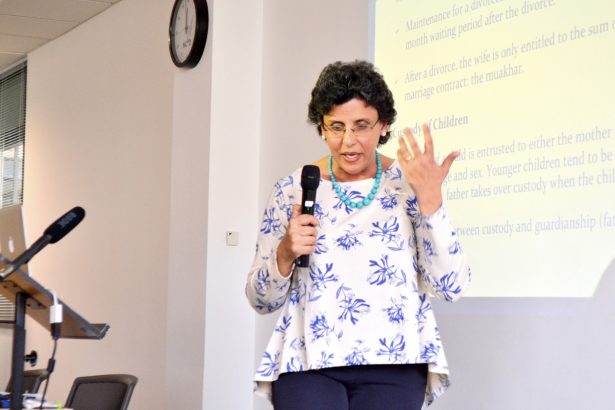Dr. Elham Manea is the author of The Arab State and Women’s Rights: The Trap of Authoritarian Governance (2011) and Women and Shari‘a Law: The Impact of Legal Pluralism in the UK (2016). Yemeni and Swiss, she works at the Political Science Institute at the University of Zurich, and was appointed in 2010 by the Swiss Federal Council to the Federal Commission for Women Affairs. In a wide-ranging interview with Fathom she addressed two central obstacles to women’s equality in the Arab and Muslim world: authoritarian governance and Islamist ideology, as well as reflecting critically on ‘the essentialist paradigm’ which prevents many Western progressives, including many western feminists, from making solidarity with oppressed Arab and Muslim women.
Personal Journey
Alan Johnson: Can you tell us a little about your personal journey? You were born in 1966 in Egypt and grew up in eight countries including Yemen and Switzerland. I am intrigued by a remark you made to another interviewer: ‘If it were not for my father, I would not be answering your questions now.’ It sounds like there is a story there.
Elham Manea: Yes, there is a story to tell. I am a daughter of a Yemeni diplomat. He came from a humble background but his dedication to education got him a scholarship – one of the famous pioneering group of 40 young northern Yemeni students who left in 1947 for higher education. His journey made him the person he was – a humanist who was disappointed in the fate of his country. Instead, he put his energy and belief into my brother and me. He called me the ‘Sultana,’ and the Sultana can dream of the stars and with hard work she will hold them in her hands. That was his attitude. Our conservative tribal tradition did not mean a thing to him. My story highlights the arbitrary nature of patriarchal structures. With a different father, I would have married at a very early age and my education would have ended at the age of 12 – a cousin of mine had this experience. I would not have talked to you today. Love and determination can change the life of a person.
Authoritarianism: Arab Governance and Women’s Equality
AJ: The UN’s ‘Arab Human Development Report 2005: Towards the Rise of Women in the Arab World’ set out over 335 pages a depressing picture of women’s oppression and inequality. Over a decade later, and subsequent to the 2011 uprisings and their mostly awful aftermath, have things got better or worse for Arab women?
EM: The outcome of the Arab Spring, if you exclude Tunisia, was an utter disaster. But if you look away from the political level, you will see an awakening that was absent before. Young women and men are starting to question social and religious orders on issues like sexual rights, LGBT rights, changing family laws. They are questioning a social order sanctioned by religion; not just headscarves, many other previously taboo issues are being discussed openly.
Women in Tunisia stand to benefit from their revolution – though not economically, I am afraid. Tunisia was always the role model for secularism and women’s rights. Today it is leading in introducing legal rights hitherto deemed ‘impossible,’ such as equality in inheritance and a women’s right to marry a non-Muslim. What worries me about Tunisia, though, is the missionary work (Dawa) being conducted by Islamists in the country. They are doing what the Muslim Brotherhood did in Egypt in the 1970s and 1980s – working patiently and betting on the future. Going back to your question, the situation is still bad, but it will change.
AJ: In 2011 you published The Arab State and Women’s Rights: The Trap of Authoritarian Governance. That book addressed a puzzle: in many Arab states women are granted suffrage rights and public rights but are often discriminated against by the state in their private lives. To try and make sense of this puzzle you looked at how the political logic of the authoritarian Arab state – Yemen, Syria, and Kuwait in particular – impacted on its gender policies in the public and private spheres. How did you come to write that book?
EM: This was my post-doctoral thesis turned into a book. I wanted to look at the impact of religion on women’s rights in the region. I had travelled in the region for my fieldwork and when I came back I had a different question: yes, religion tends to discriminate against women, but my question was now, ‘Why is religion still relevant in the politics of Middle Eastern Authoritarian regimes?’ As you say, the book argues that the Arab state functions according to a certain ‘logic’ and ‘patterns’ and that these have direct consequences on its gender policies, in both the public and private spheres. Therefore, I suggested the concept of ‘the authoritarian Arab state’ as a theoretical framework of analysis, and I used this framework to study women’s rights in several Middle East and North Africa (MENA) countries.
AJ: What were your central claims?
EM: The Arab authoritarian state has three features: it lacks legitimacy, its ruling elites depend on a traditional base of power, and it is constantly engaged in the politics of survival. One strategy of the politics of survival is ‘playing the Islamist card;’ the state leader and elites seek to take advantage of the phenomenon of political Islam and/or fundamentalist Islam. The regime endorses certain Islamist groups rather than others and forges political alliances with those groups. The main aim of this strategy is political: to deploy the support of Islamist groups as a means of legitimising the regime in a religious sense, while delegitimising its rivals. The tactic has also been instrumental in undermining rival Islamist groups that pose real challenges to the state’s leadership, as well as helping the regime to sideline, or even gain the reluctant support of other political groups that fear the rise of political Islam in their societies. The leader exploits the fear of Islamic fundamentalism and its intolerance of non-Sunni, non-Shi’ite, or non-Muslim groups, as well as exploiting the fear of the tyranny of theocratic rule and the fear of being branded as anti-Islamic.
These three features of the authoritarian Arab state prevent the state from following coherent gender politics and sometimes make it act against its own (rhetorically declared) objective of women’s emancipation. I argue that we must look more closely at these three features and how they shape the state’s gender politics.
AJ: How do these arguments stand up in light of the 2011 uprisings?
EM: The politics of survival tends to persist in a context of weak democracies and authoritarian regimes alike. One should only look at the type of alliances elected Egyptian President Mohamed Morsi and later President Abdel Fattah el-Sisi engaged in and how these had a direct impact on specific gender policies. It is important to mention here that Arab leaders are Machiavellian in their conduct of politics – whatever serves their interests and survival they will do. That makes their gender policies opportunistic. If more equality made sense from their narrow political point of view, they would go for it. The Islamists, on the other hand, have an unwavering position on women’s rights. They believe in a social order which is inherently discriminatory against women. They believe God – claiming that the difference in rights of women and men are shaped by their biological differences – sanctions this order.
Shari’a and Women’s Equality
AJ: You are an opponent of the ‘soft legal pluralism’ that would welcome the introduction of Shari’a courts to western societies. This policy is usually motivated by a commitment to some kind of ‘multiculturalism’ and the idea that law should adapt to the ‘culture’ of migrants, especially their religious culture, especially Muslims, by becoming plural, i.e. not ‘one law for all,’ but different laws for different cultures. You reject this policy and in 2016 published Women and Shari‘a Law: The Impact of Legal Pluralism in the UK. Can you tell us what kind of research you carried out in the UK and what your central findings were?
EM: As Britain was often cited at conferences and in the research literature as a ‘good example’ of soft legal pluralism, a bit of a model, I decided to research the British case. So I went to Islamic sharia councils and Muslim arbitration tribunals in various British cities, and met their leading sheiks, including the only woman on their panels. I also interviewed experts – lawyers, and activists in civil society and women’s rights groups, especially from within the Muslim communities – in addition to talking to politicians who were pleading for a reform of this ‘model’.
AJ: And the main findings?
EM: The moment the state starts to situate rights within a group frame rather than an individual frame the outcome will likely be segregation, inequality and discrimination. The weakest will be left vulnerable, subject to abuse and discrimination. This is the main consequence of legal pluralism, whether weak or strong.
A key consequence of introducing weak legal pluralism and with it Islamic law in Western legal systems will be a stratified citizenry, involving two types of women: Western women who can enjoy their rights based on the state’s laws, and migrant women who cannot. The system in the UK has in effect created these two types of citizens; one enjoys equality before the law and the other does not because of their religious identity. These women suffer from the double discrimination syndrome: in addition to gender discrimination they are also denied access to their legal rights. Indeed, this stratification will only further cement the walls around the closed parallel societies existing in the UK.
In addition, the system is, de facto, legitimising polygamous marriages, and facilitating child marriage and forced marriage – all related to the type of Islamic jurisprudence implemented in the UK.
Most significantly for the cohesion and unity of society and the fight against extremism, soft legal pluralism has continued to separate minority groups from the wider society and has given Islamists a free hand in reinforcing their social control over closed communities. The issue is not only the use being made of the law by conservative clerics and imams. Islamists often control British sharia councils, and those working in the sharia councils often display the ideological and political features of Islamism.
AJ: You trace the roots of the support offered by some western liberals to the introduction of Sharia to what you call ‘the essentialist paradigm’. Can you explain what the central features of this paradigm are?
EM: The essentialist paradigm is characteristic of Western academic post-colonial and post-modern discourse and has dominated it for far too long. It treats people as belonging to homogeneous groups, essentialising their cultures and religions. It underestimates its own deleterious impact, as an academic and political discourse, on human rights. It discards the voices of people who it deems as being ‘not authentic’ representatives of a culture conceived as singular and unchanging.
Four features characterise the essentialist paradigm:
- It combines multiculturalism as a political process with a policy of soft legal pluralism, dividing people along into cultural, religious and ethnic silos, treating individuals differently on account of their ‘cultural differences,’ in the process setting them apart and placing them in parallel legal enclaves.
- It perceives rights from the perspective of the group: the group has rights, not the individuals within it. It insists that each group has a collective identity and culture, an essential identity and culture, which should be protected and perpetuated even if doing so violates the rights of individuals within the group.
- It is dominated by a cultural relativist approach to rights (in both its forms, as strong and soft cultural relativism), and believes that rights and other social practices, values and moral norms are culturally determined.
- It is haunted by the white man’s/woman’s burden caused by a strong sense of shame and guilt over the Western colonial and imperial past and a paternalistic desire to protect minorities or people from former colonies.
AJ: After studying the response of Western academics to the development of Sharia in the UK you concluded that ‘absent from their discourse is the actual experience of legal pluralism’. Why do you think so many people in the West who self-identify as ‘progressives,’ women as well as men, theorise about legal pluralism without taking women’s experience into account?
EM: The motives of these ‘progressives’ are in fact noble. They want to protect. The problem is that their essentialist paradigm acts as a filter that does not allow them to see these women as individuals with rights. Rather, they are seen only as members of a cultural group. Worse, the group is then reduced to its religious identity – no diversity is possible, according to this prism. Hence a Muslim woman is seen as part of a group called ‘Muslims,’ and ‘the Muslims’ are believed to want the headscarf, want halal food, never engage in sex before marriage and are happy with sharia. It is actually a racist way of seeing human beings – not as individuals, equal and diverse, but rather a part of a group that must be religious. So, while the motives of the progressives are to protect, they end up ignoring or justifying dire human rights violations committed in the name of the culture and religion.
AJ: Some say it’s a matter of ‘choice?’ How do you respond to that argument?
EM: The social context is not considered at all by those people. We are talking about closed communities where both young women and men are subjected to a suffocating social control. This makes an exit ‘option’ and the exercise of choice simply unrealistic. The report ‘When Legal Worlds Overlap’ argues that the exit option requires the presence of a welcoming community and of autonomy and access to resources. But for many women those things are not present. What is present is very strong pressure to conform to ‘tradition’. Ultimately, assessing the extent of individuals’ ‘free choice’ in such cases can be next to impossible.
AJ: In 2016, after reflection and discussion, you decided not to provide testimony to the UK’s ‘Independent Review into the application of Sharia law in England and Wales’. Why was that?
EM: It was not an easy decision at all. But I had to make a stand because of my concerns with (a) the terms of reference of the panel, (b) the inclusion of a number of Islamic scholars on the panel, i.e. people who are part of the system the Review was supposed to be investigating, rather than independent judges, lawyers and experts capable of examining a human rights issue, and (c) the specific issues before the Inquiry, which did not include the type of law being implemented and the role of Islamic extremism in the promotion of this parallel legal system.
While I welcomed the Inquiry and respect the Chairperson, I was very concerned about the implications of all this for the scope and impartiality of the Inquiry. It seemed to me that as it was constituted it would not be in a position to address the discriminatory nature of the law applied in the parallel legal system of Sharia law in the UK, nor the Islamist extremism that feeds it. The fact that this inquiry was concluded in a hushed-up manner only confirmed my suspicions about it.
A Humanist Islam?
AJ: In 2005 you wrote Diary of an Arab Woman, a series of articles for the reformist liberal Arab website Middle East Transparent. In those articles you sought to elaborate a ‘humanist Islam’. In 2014 you told a conference that ‘to be a humanist, to be a secular, does not necessarily mean to be an atheist’. Indeed, you have argued that ‘the time is ripe for a humanist reading of Islam’. What is ‘humanist Islam’?
EM: A humanistic reading of Islam argues that faith should be based on rationality, for without it, there is a danger of the justification of tyranny in the name of God. A humanistic Islam is an approach to religion and life. It does not claim to be the ‘true’ manifestation of anything. It is just a framework, composed of four components.
The first addresses the issue of identity. You must have noticed that the ‘Islamic identity’ has been the core of the Islamists’ message: ‘We are Muslims first’ they insist. Youth living in Europe and Arab societies, disoriented by many factors, may find some solace in such an identity. It is what I call the ‘run-away identity’. I suggest a ‘humanistic identity’ as a counter. The other components of humanistic Islam go beyond the attempt to provide an alternative to the Islamists’ arguments. They deal with core issues of the Islamic religion that were for various reason set aside during the course of Islamic history.
The second component is setting the record straight about what kind of religion I choose to follow: one that is based on the principles of freedom of choice and rationality.
The third component touches on my right as a person who considers Islam her religion to cross the ‘forbidden areas of thinking’. Talking about the human and historical nature of religious scriptures is one such forbidden area of thinking.
Finally, the fourth component of a humanistic Islam deals with the one core issue that, if addressed seriously, could in my opinion change the course of Arab future: the gender question in Islam.
AJ: Let me push you here: some might ask, if it’s true as you say that ‘while Quranic verses treated women as equal to men in front of God, these verses put women at a disadvantaged position legally’ and that ‘one saying (Hadith) of the Prophet which has become instrumental in Islamic consciousness states that “women are less in their brain and religion”’ how can Islam be reformed to accommodate the notion of women’s equality, especially since revelation is held to be unmediated and absolutely binding on Muslims?
EM: I guess we have to start with the assumption that ‘Quranic revelation is unmediated and absolutely binding on Muslims’. I believe that the time has come to acknowledge the human nature of Quran – it is the spoken words of Mohammad, the Prophet of Islam, written down by humans. Once we accept this fact, and the historical nature of our religious texts, it will be possible to move forwards and change the laws according to modern concept of human rights and gender equality.
The relative silence of western feminist organisations
AJ: It is often said by liberal Arab feminists that western feminists and human rights activists do not do enough to support them. (I am putting this mildly!) The Saudi Arabian reformer Wajeha Al-Huwaider has said: ‘I wish I knew why the situation of the women in certain Arab states is not condemned by the countries of the world, and does not enrage their citizens. Why do the human rights activists ignore their suffering as though they do not even exist?’ The Algerian feminist Khalida Messaoudi cries out: ‘Without your support, without the women’s and human rights movement of the countries of the West, we are losing this battle of life and death.’ Why do you think support from western feminists is so often lacking?
EM: I think you should ask these Western activists why they hesitate to fight for rights they profess to hold dear. I believe they are suffering from what I called in my book the ‘Winnetou Syndrome’. Winnetou is a fictional Native American hero of several novels (later adapted to films) written in German by Karl May (1842–1912). The novels became best sellers partly because of their romantic portrait of an imagined simpler life in close contact with nature. This romantic perception of other cultures seems to me very dominant in these activists’ essentialist paradigm; it leads them to fear they might offend the noble ‘Other’ and be guilty of imposing their own ‘Western’ laws and values on them. The argument seems to be that we cannot force our own values on these poor but noble souls from distant cultures. I do not look to these Western activists for inspiration or support. They can offer none. I believe, however, they can learn a lot from the women fighting for their rights in the MENA region.
Does the West have the right strategy to defeat Islamist terrorism?
AJ: In a discussion at the Human Rights Summit in 2015 you argued that the West gets the policy towards Islamist-inspired terrorism wrong twice over. On the one hand it partners with states such as Saudi Arabia and Qatar, who are promoting the non-violent Islamism that provides the narrative for violent Islamism and extremism, thus allying with the very forces that are promoting the sectarian ideology that fuels the groups the West is fighting against. On the other hand, those who favour a very aggressive and even militaristic policy are destabilising the region, creating a vacuum into which the Jihadis move, creating ‘pockets’ all over the region. Why does the West keep getting it wrong? Ignorance? Hubris? Imperialism?
EM: Pure realist politics. It is as simple as that. I often tell my students that the alliance between Saudi Arabia and the US is like a catholic marriage. They may hate each other but they are stuck with each other. As someone who studied international relations, I tend to be a realist here. I do not expect states to move in directions that will harm their national interests. What I am saying is that it’s in your national interests to end this type of alliance and to insist on a new deal. The type of Islam promoted by these countries is paving the ground for the violence the West is fighting. Their policies are destabilising and that will ultimately bounce back and hit the West painfully.
AJ: You suggested that it was in the ‘long-term interests’ of the West to ‘crack down on this ideology’ and to support human rights’. No other policy, you argued, was sustainable. Again let me push you here. What if the West can’t really do anything about that ideology? What makes you think we can do anything at all about the ideology? Some say the task of transforming the dominant interpretation of Islam is for Muslims. Sir John Jenkins recently wrote this:
In 2014 I prepared the Muslim Brotherhood Review, an internal review of the global Islamist movement for the British Government. Much of the British government’s policy work on the Muslim Brotherhood – and indeed Hezbollah, Hamas, the Houthis and even Iran – in recent years has been shaped by claims that we can influence the thinking of both Sunni and Shia Islamists if only we engage with them. But I cannot think of a single example where Western diplomatic or any other sort of engagement has produced any change in the position of any political Islamist.
AJ: What would you say to Sir John?
EM: I would tell him, ‘you are right’. Islamists are following an ideology based on a fundamentalist interpretation of religion. In their minds, they are following a religious mission, the objective of which is domination and a world order where Muslims stand as supreme. If you read their literature, you will be surprised how open they are: ‘We should exploit democracy because it will allow us to preach and assume power,’ there are times to ‘work with the infidels’ and times to ‘fight them’ and so on.
So it is not engagement that I am calling for, but rather a confrontation. In an Arab context, some intellectuals are waking up to the reality of damage caused by this type of ideology. Wherever this type of ideology is spread, it persecutes minorities, women and people of different beliefs. It creates schism in society and undermines social cohesion. The numbers of men and women willing to confront this ideology is rising in the MENA region. So yes, challenging this ideology and its reading of Islam is something that we have to do for ourselves. But if you think that Islamism is a phenomenon that only exists far away, you might be disappointed. It is in our midst here in Western democracies too. Tolerating it has become an official policy of many of these democracies. The consequence has paved the ground for closed communities and is undermining important human rights norms and values, such as freedom of speech and gender equality.
AJ: You say the West can’t walk away, but what does ‘staying’ mean? Many think the very presence of the West is a recruiting tool for the extremists.
EM: Staying means not leaving the job unfinished. If you do something, do it well; and if you created a mess, it is only logical that you should clean that mess before leaving. We know that former President George W. Bush and Prime Minister Tony Blair made a huge mistake invading Iraq, but it was irresponsible to leave the country to its demons before stabilising it. President Barack Obama made a huge mistake by his hasty and naïve decision to pull American troops out just because he made an election promise. His military advisors and those working on the ground were against that decision and knew better. A similarly hasty decision after the Cold War in Afghanistan was part of what led to 9/11.
The Future
AJ: What are you working on now?
EM: A book on non-violent Islamism. I argue that non-violent Islamist extremism, in both its political and societal forms, provides the main ideological framework and worldview of violent Islamism. The non-violent Islamists claim to be the sole group speaking for Muslims in the West; insist that they (Muslims) be treated as a ‘homogenous group,’ assert that human rights is a ‘Western imposition,’ and present their own Islamist demands as those of all Muslims. Often, Western policy makers oblige and treat these organisations as ‘representatives of all Muslims’. This in turn has ramifications as the Islamists’ stipulations undermine the secular human rights-based order of Western democracies. It put to question the very achievements of Western democracies, especially those concerning separation of state and religion, women’s rights and freedom of expression. The reluctance of mainstream politicians to defend these norms and values, combined with the ‘white man’s burden’ which haunts leftists and liberals alike, have allowed these movements to spread their ideology within Muslim communities. They control Quran schools, youth activities and mosques, and succeed in the process in separating Muslims from their general societies, transforming them into closed communities with their own parallel rules and norms. It is this type of Islamism that should concern us.






































I think the main reason why western feminists dislike hearing from the Arab/Muslim feminists or about the issues women face in the middle east is because it makes their own bellyaching about life for women in the US and the west in general seem outright frivolous. Feminists in the West actually have to create terms like “microaggressions” and “subliminal misogyny” in order to justify their ongoing war with western societies. Despite the left embracing the “global” thinking mantra, the Left cannot seem to go global with human rights. Political correctness in their own spheres trumps worldwide individual freedom. Rather than congratulate themselves for a well-won combat mission in the West and then move on to parts of the world lacking in even a remedial of equality, the Left wages a perpetual battle with the West itself, although most of those battles were won decades ago. Their irresponsible refusal to acknowledge the harsh conditions for women (and gays and other minorities) in the Middle East is due to their far left leanings, but in the end, futuristic western dystopian predictions like “The Handmaid’s Tale” (which was written over 30 years ago) is not fiction in the middle east. However, it might become fact in the west if the feminist Left continues to embrace the most radical elements of Islam just to piss off the United States. Sharia law, which the left cheers for as part of its ongoing multicultural orgy, is almost exclusively established to maintain a patriarchy order over women, legitimizing even executions, yet the Left, including leaders across North America, Australia and Europe, celebrate it. They act as cheerleaders for Sharia courts in their own western countries as some kind of gold star proving their tolerance, refusing to criticize it on any level. What can be said about such widespread toxic dementia? I don’t see anything “noble” about such idiocy. The Left may call my kind of concern “right wing” or “conservative,” but if “progressive” and “liberal” are terms that mean turning a blind eye to true-life death squads against women and gays, then I wear the label “conservative” proudly. Really, the Western “social activist” is a spoiled brat.
But once more we hear only this narrative of helpless unwilling imprisoned muslim women, struggling to be liberated or liberate themselves. No one ever seems to much discuss the willing complicity, frankly, of muslim women in Islamism , militantism, islamic conservatism, values passed actively and willingly to the children directly and enthusiastically by the women, as well as even eager collaboration in the compulsion of other muslim women. When France, Belgium, even Turkey attempted so-called scarf/burqa laws a few years back, there were mass protests. Looking at the protestors, they were overwhelmingly muslim women. I saw no men forcing them directly on the spot.
Author Kemal Salaam, in his book ‘the blood of the lambs’ , gives many direct and indirect indications of the role of his –mother– in his politicisation and radicalisation from very early childhood. The hand that rocks the cradle, all over the Islamic world.And in the Islamic communities in the West..